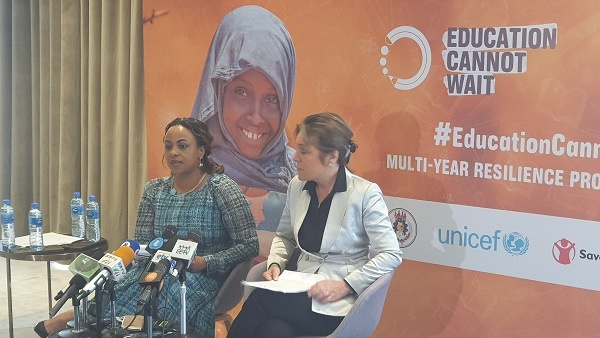
Education Cannot Wait’s new initiative provides protective learning environments and inclusive quality education to to children affected by crises in Ethiopia
ADDIS ABABA (ECW) – Education Cannot Wait (ECW), the global fund dedicated to education in emergencies, has announced a three-year, US$165 million initiative to provide education to 746,000 children affected by crises in Ethiopia. Simultaneously, ECW announced a planned seed grant of US$27 million to support initial efforts that include mobilizing US$138 million needed to fully fund the program.
Speaking at the launch in the Ethiopian capital, ECW Director Yasmine Sherif said the program is designed to address the specific challenges holding back access to quality education of children and youth in communities – these are the children left furthest behind due to violence, drought, displacement and other crises.
“Working with the Government and all our Education Cannot Wait partners, this investment provides protective learning environments and inclusive quality education to girls and boys living in very difficult circumstances,” she said. “We must not leave them behind. They too have a right to develop and thrive. They have so much to achieve and give. By working together in mobilizing all the required resources, we now have a chance to ensure that no child in Ethiopia is left behind.”
- See also: Education Cannot Wait hails Britain’s £90m contribution to education for vulnerable children
The multi-year resilience program was developed by the Ministry of Education with support from Education Cannot Wait and a range of partners – United Nations agencies, civil society organizations and donors – to address the educational needs of displaced children.
Ethiopia has an estimated 1.4 million displaced, returnee, and refugee children, mostly resulting from conflicts and natural disasters. One million of these children are out of school, 527,000 of them girls. Latest data shows that 728 schools have been damaged by conflict or natural disasters.
The ECW program will provide educational opportunities to 746,000 children – 380,000 boys and 365,000 girls, including 74,600 children with disabilities. Of these, 213,000 children will access early childhood education and 532,000 will receive primary education. The program will further build the capacity of 1,200 refugee teachers to achieve diploma level certification.
ECW has earmarked seed funding of US$27 million to address the educational needs of 60,487 displaced children, returnees, and children from host communities in Amhara, Oromia and Somali regions. Part of this money will also support efforts to mobilize the funding gap of US$138 million needed to fund the whole program.
The Ministry of Education will lead the program in partnership with Save the Children International, UNICEF, Education Cannot Wait, and the Education Cluster. UNICEF and Save the Children will implement Education Cannot Wait’s planned $27 million three-year grant.
About Education Cannot Wait (ECW)
ECW is the first global fund dedicated to education in emergencies. It was launched by international humanitarian and development aid actors, along with public and private donors, to address the urgent education needs of 75 million children and youth in conflict and crisis settings. ECW’s investment modalities are designed to usher in a more collaborative approach among actors on the ground, ensuring relief and development organizations join forces to achieve education outcomes. Education Cannot Wait is hosted by UNICEF. The Fund is administered under UNICEF’s financial, human resources and administrative rules and regulations, while operations are run by the Fund’s own independent governance structure.
To date, ECW investments span more than 30 countries affected by armed conflict, disaster and forced displacement. Visit ECW website for more information.
Source: ECW
